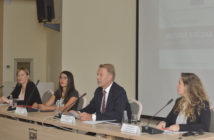 (Podgorica, 1. November 2012.) – MANS has gathered information about the abuse of state resources during the recent parliamentary elections. Neither of the two institutions responsible for monitoring the Law on the Financing of Political Parties considers that it has the jurisdiction to process abuses of the law. According to the existing Law, Article 29 clearly stipulates that the State Electoral Commission (DIK) and the State Auditing Agency (DRI) are responsible for implementing the act.
(Podgorica, 1. November 2012.) – MANS has gathered information about the abuse of state resources during the recent parliamentary elections. Neither of the two institutions responsible for monitoring the Law on the Financing of Political Parties considers that it has the jurisdiction to process abuses of the law. According to the existing Law, Article 29 clearly stipulates that the State Electoral Commission (DIK) and the State Auditing Agency (DRI) are responsible for implementing the act.
The Law itself contains a number of clauses that relate to the abuse of state resources during elections, stipulating clearly the institutions responsible for implementing the law. These stipulations relate to the ban on hiring persons during the pre-election campaign, a ban on the political engagement of functionaries and civil servants during working hours, a bar on paid advertising of all state and local institutions in the media, as well as a ban on excessive budgetary expenditures by state and local institutions during the pre-election campaign.
The DKI and DRI have unfortunately declared themselves not to have jurisdiction over the processing of those responsible for violating the law (in spite of MANS clearly demonstrating that they were breaking the law during the elections).
We were first informed of the supposed lack of jurisdiction by the DIK. In their correspondence with us, the DIK claims that it does not hold the jurisdiction for processing any of the abuses that MANS indicated. Furthermore, this institution hasn’t informed us who then is responsible for implementing the party financing law.
After hearing from the DIK, we also heard from the DRI (who invited MANS to a meeting). The member of the DRI senate, Branislav Radulovic, informed us in person that the DRI is not responsible for acting on our initiatives (where we asked that all functionaries that violated the law be processed).
Nevertheless, we find the fact that the DRI will not submit a written response stating that they have no jurisdiction in the matters we’ve brought before them particularly interesting. In the case that we receive such a written communication, as they’ve promised us, they should also state who exactly is the responsible party. Otherwise, this would mean that the existing Law has left a considerable gap in implementation.
For all of these reasons, the institutions of the system, through their failure to take up their responsibilities under the law, are effectively enabling state and local functionaries to feel like they can abuse budgetary resources for their campaigns (and thus influence the choices of voters) without fear of legal sanctions.



